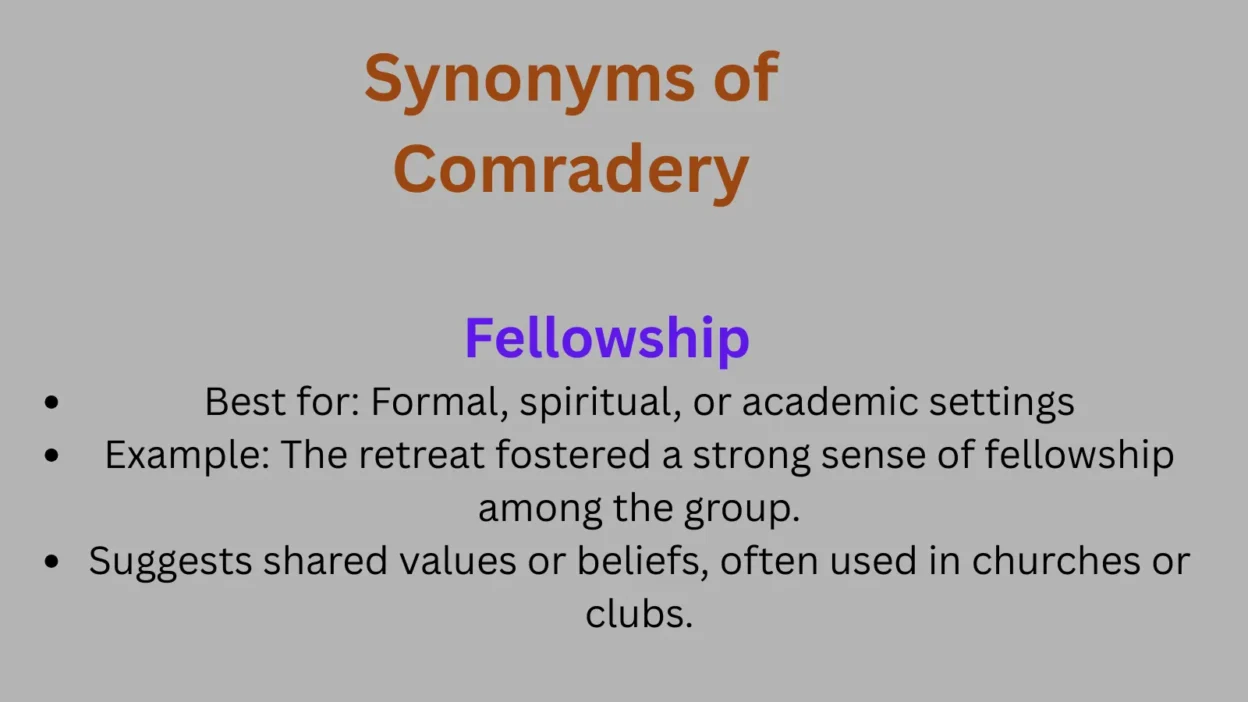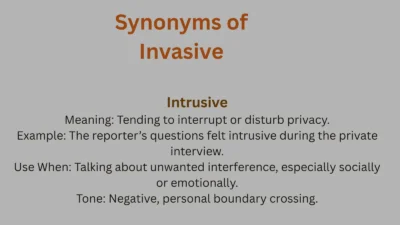Understanding the depth of comradery goes beyond simply calling it friendship—it’s about shared trust, mutual respect, and the bonds formed through common experiences. If you want to convey warmth, loyalty, solidarity, or a more formal tone, the right word can bring your meaning to life. That’s why exploring a variety of synonyms of comradery is so valuable—to capture exactly the emotion or nuance you intend.
In this guide, you’ll discover carefully chosen alternatives to comradery, each explained with sentence examples and tips on when to use them.
You’ll also learn how to select the perfect word to fit the tone, context, or level of intimacy in your message.
What Does Comradery Really Mean?
Comradery (also spelled camaraderie) refers to a warm, trusting, and friendly bond among people who spend time together—especially through shared experiences, challenges, or goals. Think of teammates laughing after a hard game, coworkers joking during a late-night project, or lifelong friends reminiscing over coffee.
It often conveys:
- Mutual respect
- Shared purpose
- Emotional closeness
- Unspoken understanding
Unlike words that describe loud or boastful friendships, camaraderie carries a quiet warmth. It suggests loyalty, fellowship, and a sense of unity, often with a touch of modesty or humble connection.
Now, let’s explore 30 fantastic synonyms you can use in its place—each with its own vibe and best-fit moment.
Synonyms of Comradery and When to Use Them
1. Fellowship
- Best for: Formal, spiritual, or academic settings
- Example: The retreat fostered a strong sense of fellowship among the group.
- Suggests shared values or beliefs, often used in churches or clubs.
2. Brotherhood
- Best for: Male-dominated or fraternal groups
- Example: There was a brotherhood among the firefighters that went beyond the job.
- Implies loyalty and mutual protection.
3. Sisterhood
- Best for: Female-focused communities or solidarity groups
- Example: The sisterhood at the women’s shelter was both healing and empowering.
- Emphasizes shared struggles and mutual support.
4. Friendship
- Best for: Everyday casual use
- Example: Their friendship had survived college, jobs, and distance.
- A broad, all-purpose term for close, affectionate bonds.
5. Bond
- Best for: Deep emotional or familial ties
- Example: They had formed a bond over their love of books.
- Works well when emphasizing emotional depth.
6. Team Spirit
- Best for: Sports or workplace collaboration
- Example: The team spirit in the office was high during the product launch.
- Focuses on group energy and motivation.
7. Kinship
- Best for: Emotional closeness, even among non-family members
- Example: He felt a kinship with others who had faced the same hardship.
- Ideal when referring to empathy or shared history.
8. Solidarity
- Best for: Political, activist, or serious support contexts
- Example: Protesters stood in solidarity with workers nationwide.
- Carries a strong, purposeful tone.
9. Rapport
- Best for: Professional or polite relationships
- Example: The teacher quickly built rapport with her students.
- Highlights ease of communication and comfort.
10. Companionship
- Best for: Comfort in the presence, especially long-term
- Example: After retirement, he found companionship in his dog.
- Suitable for quiet, stable relationships.
11. Cohesion
- Best for: Groups functioning well together
- Example: The unit’s cohesion was critical to their mission’s success.
- Reflects efficiency and unity in action.
12. Affiliation
- Best for: Organizational or formal connections
- Example: Her affiliation with the hiking club brought new friendships.
- Use when referencing memberships or groups.
13. Alliance
- Best for: Strategic or goal-driven relationships
- Example: The companies allied to challenge the market leader.
- More tactical than emotional.
14. Harmony
- Best for: Peaceful, well-balanced relationships
- Example: The roommates lived in perfect harmony despite different routines.
- Suggests ease and lack of conflict.
15. Togetherness
- Best for: Family, holidays, or affectionate moments
- Example: The holidays were always about love and togetherness.
- Warm, homey, and emotionally rich.
16. Nexus
- Best for: Abstract or intellectual bonds
- Example: Their collaboration formed a nexus of art and science.
- A more sophisticated way to describe a connection.
17. Understanding
- Best for: Emotional intuition between people
- Example: There was an unspoken understanding between them.
- Implies emotional intelligence and empathy.
18. Affection
- Best for: Loving or caring relationships
- Example: He always spoke to her with genuine affection.
- Evokes gentleness and warmth.
19. Closeness
- Best for: Physical or emotional proximity
- Example: They maintained their closeness even across continents.
- Straightforward and sincere.
20. Association
- Best for: Professional or societal groups
- Example: Her association with the foundation gave her purpose.
- Use in formal contexts.
21. Union
- Best for: Shared cause or marital/contractual bond
- Example: Their union was built on mutual trust and laughter.
- Can be literal or symbolic.
Quotologi.com is your new home for meaningful quotes that inspire your day, lift your mood, and touch your heart.
22. Affinity
- Best for: Natural, instinctive attraction or connection
- Example: They had an instant affinity for each other’s ideas.
- Subtle, almost magnetic in tone.
23. Sympathy
- Best for: Shared sorrow or emotional support
- Example: She felt deep sympathy for the grieving family.
- Often used in consoling or empathetic contexts.
24. Empathy
- Best for: Emotional mirroring or deep understanding
- Example: His empathy made him a trusted confidant.
- Goes beyond sympathy—more personal and reflective.
25. Connection
- Best for: General emotional or relational ties
- Example: They lost touch, but the connection remained.
- All-purpose, easy to relate to.
26. Fraternity
- Best for: Academic, male-dominated, or social groups
- Example: The fraternity organized weekly volunteer events.
- A traditional or formal tone.
27. Clique
- Best for: Tight-knit but exclusive groups
- Example: The office clique often left others feeling left out.
- Slightly negative or exclusive in feel.
28. Circle
- Best for: Social groups, especially casual
- Example: She had a small circle of close friends.
- Invites a feeling of intimacy.
29. Network
- Best for: Professional or industry relationships
- Example: His network helped him land the new job.
- Businesslike and strategic.
30. Entourage
- Best for: Celebrity, leadership, or high-profile figures
- Example: The actor arrived with his usual entourage in tow.
- Implies a group that follows or supports a central figure.
How to Pick the Right Synonym for Comradery
Here’s how to find your perfect match:
For Warmth and Intimacy
Choose: Friendship, Affection, Closeness, Togetherness, Bond
For Formal or Group Settings
Choose: Fellowship, Fraternity, Alliance, Association, Network
For Emotional Understanding
Choose: Empathy, Sympathy, Kinship, Understanding
For Teamwork or Cooperation
Choose: Cohesion, Team Spirit, Solidarity, Union
For Subtle or Reserved Tones
Choose: Affinity, Rapport, Kinship, Nexus
Avoid When You Mean Genuine Comradery
Cliché or negative-sounding words like “clique” or “entourage” may sound off in tone when you want to evoke trust and equality.
Final Thoughts:
Exploring the synonyms of comradery opens up richer, more precise ways to express bonds of trust, loyalty, and mutual support. Each synonym offers a unique shade of meaning—whether it’s the warmth of friendship, the unity of solidarity, or the respect of alliance.
Now, you have the insight and practical examples to use these terms effectively in any context. Use them wisely, and you’ll convey connection and belonging with clarity, depth, and authenticity.
The right word can turn a simple sentence into a heartfelt message. Let your language reflect the strength of the bonds you value most.




